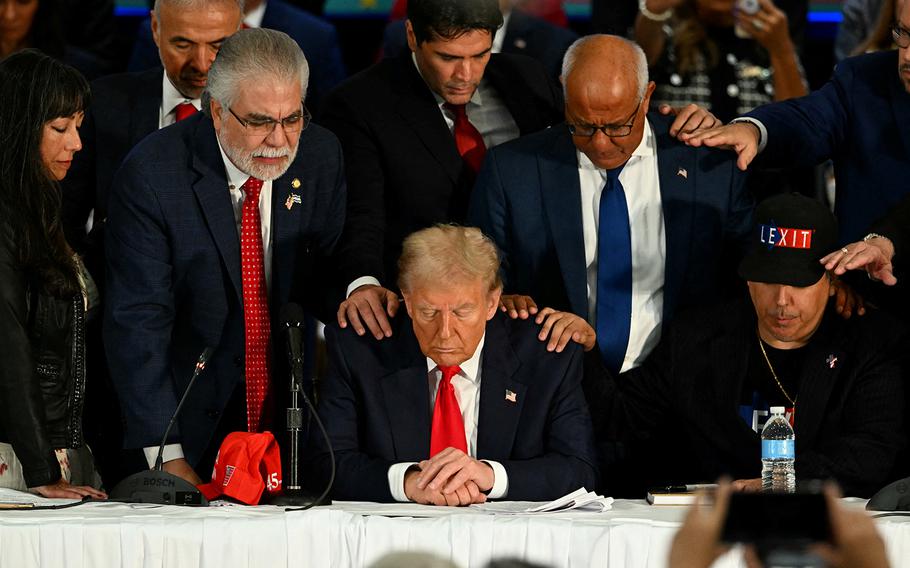
Former US President and Republican presidential candidate Donald Trump prays during a roundtable discussion with Latino community leaders at Trump National Doral Miami resort in Miami, Florida, on Oct. 22, 2024. (Chandan Khanna/AFP via Getty Images/TNS)
Donald Trump won 46% of the Latino vote, according to some exit polls highlighting the complexity and nuance of this demographic, which pundits too often mischaracterize as monolithic, or worse, an aggrieved minority. Against most expectations, a significant portion of moderate to conservative Latinos turned out for Trump, delivering critical margins in states such as Arizona and Nevada and exposed cracks in the Midwest’s blue wall including Illinois.
Chicago, long a Democratic stronghold, saw 27% to 41% of the vote in the five wards with the highest rate of Latinos go to Trump. What gives?
Progressive critics claim racism, misogyny, self-hate and even trauma rooted in 500 years of colonialism to explain away “Latinos for Trump.” Hogwash!
This outcome was not the product of identity politics; rather, it’s the culmination of built-up concern over the direction of our values on family, faith, entrepreneurship and an aspiration for upward mobility.
Trump’s appeal to economic opportunity, cultural preservation and dissatisfaction with government overreach proved a powerful message that resonated with Latinos striving to achieve their American Dream. Their vote for Trump was a rejection of the progressive movement that has veered far left and wrought havoc on Latinos’ sense of family, economic stability and community safety.
Latino culture is deeply rooted in family values and religious faith, two areas in which Trump aligned himself with these voters. Democrats leaned heavily into progressive social issues such as gender identity, LGBTQ+ rights and, yes, abortion. While younger, urban Latinos often embraced these policies, many older and more religiously devout Latinos, especially Mexican American Catholics, felt alienated.
Trump’s emphasis on protecting traditional values connected with Latinos who saw the Democratic platform as dismissive of their cultural priorities. His opposition to late-term abortion and his vocal defense of religious freedoms appealed to Catholic and evangelical Latinos, who make up a major portion of the electorate.
Latino families also took notice of Trump’s tough stance on crime and his support of law enforcement. This was particularly compelling in urban areas where concerns about rising crime rates have grown.
Latino voters gravitate toward candidates who prioritize job creation and economic growth. This message strikes a chord with a community that values its work ethic and where entrepreneurialism thrives. According to the U.S. Census Bureau, Latinos account for the fastest-growing segment of small-business owners in the nation. Latinos face the same struggles as other entrepreneurs: inflation, labor shortages and regulatory hurdles. Trump’s promise to slash regulations, cut taxes and control inflation appealed directly to Latino aspirations and frustrations.
Moreover, the perception that the policies of President Joe Biden and Vice President Kamala Harris had exacerbated rising costs — from housing to groceries — drove many Latinos away.
Within the more established Mexican American immigrant community, frustration with the Biden-Harris administration’s handling of the migrant crisis played a significant role in their vote for Trump. Many viewed the influx of new migrants — particularly from Central and South America — with deep resentment.
There’s a strong belief that new arrivals receive preferential treatment — whether through expedited processing, housing assistance, free health care, political attention and massive budget allocations — over immigrants who had earned their lot over decades without any government assistance. By promising fairness, order and stability, Trump tapped into this resentment, positioning himself as a defender of those who played by the rules.
Then there’s an overall disillusionment with the Democratic Party. Democrats rely on Latino voters as a cornerstone of their coalition, often assuming their loyalty without earning it. This sense of being taken for granted is not new, but it gained traction in 2024 as Democrats continued to focus on victimhood and identity politics over practical issues and pragmatic solutions. A hint to Dems: Many Latinos despise the Latinx and Latine labels.
In contrast, Trump doubled down on the narrative of self-reliance and opportunity. This message particularly resonated with second- and third-generation Latinos who see themselves as fully integrated into the American mainstream and reject being defined solely by their ethnicity.
A takeaway for both parties: Latinos, specifically Mexican Americans, are in search of a political home that promotes their moderate to conservative values and translates those values into public policy.
Democrats must reckon with this reality if they hope to regain ground with Latinos in future elections. Meanwhile, Republicans should view their recent gains not as guaranteed but as an opportunity to build deeper connections with this growing electorate.
Trump’s victory may well mark a turning point in how both parties understand and engage with the Latino community — a lesson neither side can afford to ignore.
Juan Rangel is CEO of The Urban Center, a nonprofit organization in Illinois that empowers moderate to conservative community leadership and public policy.